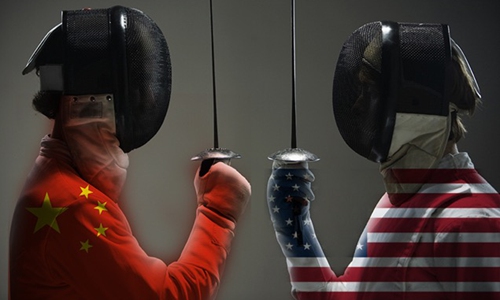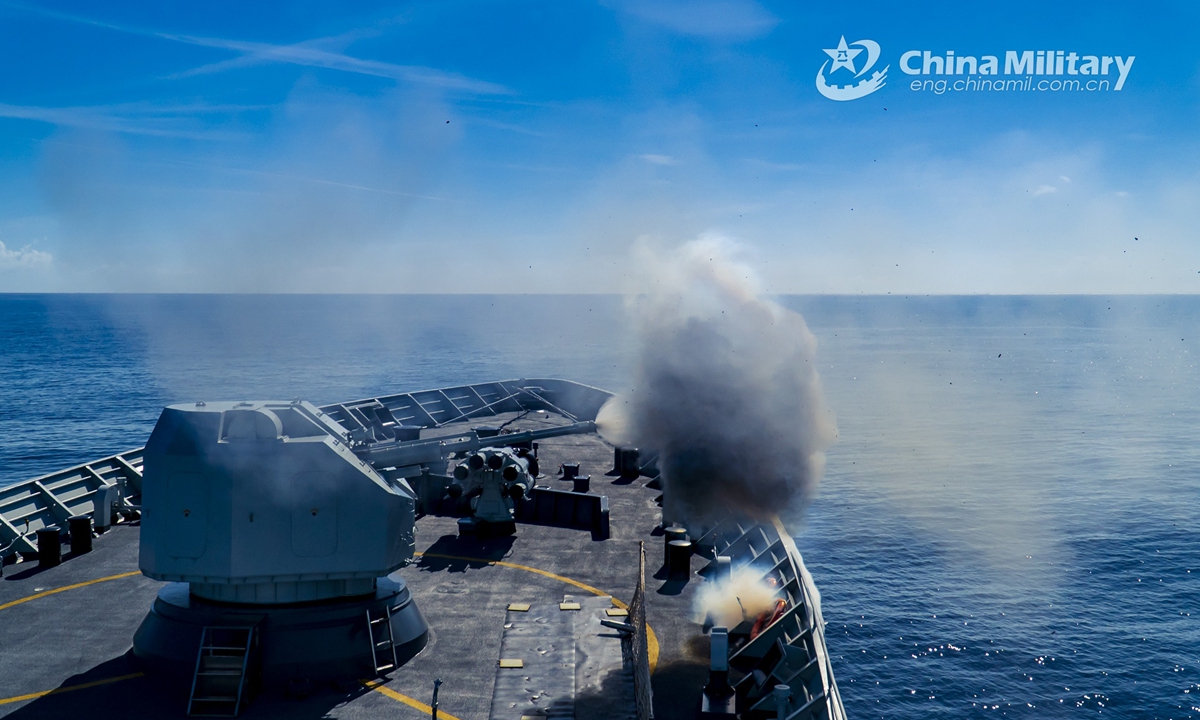‘Zero chance’ for US to isolate China
By Yang Sheng and Wang Qi Source: Global Times Published: 2020/7/15 21:48:40 Last Updated: 2020/7/15 22:18:40
Struggles to come before peaceful coexistence: experts

China US Photo: GT
Although China has tried to stabilize its ties and ease tensions with the US, the current situation showed that Washington is unwilling to stop its confrontations with Beijing. Chinese experts on China-US ties said on Wednesday that regardless of what the US did or will do to China, as long as China doesn't make a mistake and keeps on the right track of development, the possibility for the US to crack down on China is "zero."
US President Donald Trump, in announcing on Tuesday the cancellation of special treatment for China's Hong Kong Special Administrative Region, continued to criticize and stigmatize China on issues like the COVID-19 and Huawei's 5G technology, CNBC reported.
US warships and military aircraft also appeared more frequently in the South China Sea and areas near the island of Taiwan, and the US also continues to make diplomatic efforts to persuade and pressure other countries to join its team to isolate China in the international arena. These signs indicate that the US refuses to positively respond to China's proposal made by Chinese State Councilor and Foreign Minister Wang Yi on July 9 to ease tensions and mend ties by boosting cooperation, observers said.
Jin Canrong, associate dean of Renmin University of China's School of International Studies in Beijing, told the Global Times on Wednesday that China's proposal could at least give future historians proof that "if a China-US cold war erupts and the world suffers from the confrontation between the two most powerful countries, it was not China's fault, and the US should take full responsibility."
Most Chinese experts agree that the US is now using all possible measures, excluding direct military conflict, to contain China, and they have discovered that although pressure and challenges from the US are increasing sharply, China is still in a favorable position after comparing the current situation with similar cases in the past - the Cold War between the US and the Soviet Union and tensions between China and the West after 1989.
The most obvious difference is that China has already become one of the most powerful countries, and is extremely intertwined with not only the US but also the rest of the world, experts said.
Jin said the US has successfully cracked down on many "chasers" or "challengers to US hegemony" after it became the world superpower in the wake of the World War II."
"But China is different from those 'predecessors,'" Jin noted. For example, China has already surpassed the US in manufacturing output and electricity generation, and none of those "predecessors" that the US cracked down on had achieved this. Jin said these achievements made "isolation against China impossible and meaningless. The possibility for the US to crack down on us is zero."
Data provided by the World Bank shows China's manufacturing output was $3,896,345.03 million in 2019, about 1.8 times bigger than that of the US, and electricity - installed generating capacity of China - reached 1,646,000,000 kw in 2016, 1.5 times the US'.
Lü Xiang, a research fellow at the Chinese Academy of Social Sciences in Beijing, told the Global Times on Wednesday that China is not like the Soviet Union.
"To be honest, we have no intention to challenge or replace the US. But due to the sheer size of China, as long as we keep developing for a better future, we will automatically surpass the US. The US has no right to force Chinese people to abandon their demand for a better life," Lü noted.
Wu Xinbo, dean of the Institute of International Studies at Fudan University, told the Global Times on Wednesday that the US policy to confront China is to maintain its global hegemony, and doesn't mean China is really threatening the economic interests of the US.
Lü said the US doesn't care about the intention; it only cares about the capability, "so no matter how hard we explain to the US we won't challenge it, it will still make trouble for us."
Jin noted that "in the hegemonic logic of the US, asking equality from the US is not just a mistake, but also a crime," so the only way China can do is to prove it's unbreakable and undefeatable, and then force the US to accept a real equal and peaceful coexistence.

The guided-missile frigate Hengyang (Hull 568) attached to a destroyer flotilla with the navy under the PLA Southern Theater Command fires its main gun against mock ashore targets during a maritime live-fire training exercise in waters of the South China Sea on June 18, 2020. (eng.chinnmil.com.cn/Photo by Li Wei)
Nervous Washington
According to the United States Strategic Approach to the People's Republic of China that the White House released on May 20, Washington openly acknowledged that it wants to remodel China, but realized this was impossible after the 19th National Congress of the Communist Party of China (CPC), so it decided to compete with China.
Lü said, "By 'remodeling China,' the US wants the CPC to have leaders like Mikhail Gorbachev and Boris Yeltsin, who failed to reform the Soviet Union and broke the big country into pieces by trusting the West and getting deceived by Western ideology, so that it won't be a significant threat to US hegemony."
Chinese experts said China has never considered the path chosen by Gorbachev to exchange peace with the US, since the path is all about recession, chaos, and humiliation. The decisions made by Deng Xiaoping in 1978 and 1989 have already proven that China made the right choice and the Soviet Union didn't, they said.
"Therefore, Trump and those hawkish US policymakers are making their last try to see if they can physically crack China or at least eliminate China's capability to develop," Lü noted.
The US is very frustrated, because when China is at its prime and keeps growing and reducing the distance with the US on all fronts, the US is facing a rampant COVID-19 epidemic situation, economic recession, and pervasive internal divisions, Li Haidong, a professor with the China Foreign Affairs University, told the Global Times on Wednesday.
Due to the successful handling of the epidemic, China could be the only major economy that keeps positive growth in 2020. The IMF predicted in April that China's economy will likely grow by 1.2 percent this year, and rebound strongly to 9.2 percent in 2021.
The US economy is projected to contract by 5.9 percent this year, and is poised to bounce back to 4.7 percent next year, the IMF said in its report.
Unlike the US and other major economies, Asia is likely to be the only region with a positive growth rate in 2020, averaging at 1 percent. But the growth would be more than 5 percentage points below the average in the previous decade, the IMF said.
Struggles before coexistence
Chinese analysts noted that this will further narrow the distance between China and the US, and this is why the US is now trying its best to contain and interrupt China, even it will face China's retaliation and will have to pay a heavy price.
Jin said, "As long as we make no mistakes and keep on the right track, the US has no chance at all. Maybe 10 years from now, the problems will go away, because the US will accept the reality to coexist equally and peacefully with a powerful China, even if the two countries have different political systems, ideologies and cultures."
"When the US is more advanced and powerful, it is totally natural for it to make trouble for us. But when we prove we can do better than them, they will be pragmatic and make friends with us, so China-US ties will recover eventually," he noted.
Lü said before this, a series of struggles would be necessary, but China should remember that when it strikes back at the aggression and provocation from the US, it should prevent adventurism and overconfidence. And when it negotiates to ease tensions or have cooperation, it should prevent an appeasement policy and capitulate.
"China won't initially escalate the confrontation, but will make sure the US feels the pain. China will also seize any opportunity to have cooperation with the US as long as it's good for the people of the two countries and for the world," he noted, "This is how China should shape the bilateral ties in the future.".
Posted in: DIPLOMACY